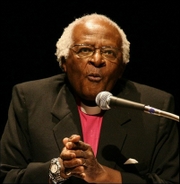
HIROSHIMA, Japan (AFP) - Archbishop Desmond Tutu has urged for a cancellation of developing countries' debts, likening their suffering to the devastation of the nuclear bombings in Japan.
Tutu made his appeal in Hiroshima, where he and fellow Nobel laureates the Dalai Lama and Betty Williams issued a joint appeal for the abolition of nuclear weapons, which obliterated this city and Nagasaki in 1945.
Tutu, a leading moral force against South African apartheid, said that debt relief was a concrete way for Japan to demonstrate its oft-stated post-war commitment to peace.
"Many, many countries, in the way you were here devastated by the atom bomb, are devastated by poverty, by disease, by an international economic system that is fundamentally unjust," Tutu said.
"I hope that your experience of the injustice of atom bombs falling on you would give you the passion, which you already have, of wanting to help others rise from the ashes," he said.
"So Japan ought to be in the forefront in cancelling all international debts that so many countries bear a heavy burden" from, Tutu said.
The Group of Eight major industrialized nations last year agreed to help alleviate poor countries' debt burden, which critics say means more money goes to paying interest than to schools or health care.
Japan, however, has been hesitant about calls for blanket debt relief, arguing that such a move would encourage imprudent borrowing.
Tutu issued a joint statement with the Dalai Lama and Williams, who won the prize for promoting peace in Northern Ireland, calling for the abolition of nuclear weapons and hailing Hiroshima's "spirit of forgiveness."
"Destruction of your neighbor and even your enemy is destruction of yourself," read the statement of the "Hiroshima International Peace Summit" organized by Japanese activists.
Tutu, who led a reconciliation commission after the end of apartheid, warned against a cycle of retribution.
"The reprisal against the suicide bomber does not bring peace. There is a suicide bomber, a reprisal and then a counter-reprisal. And it just goes on and on," Tutu said.
And he cautioned against linking Islam to terrorism.
"There are terrorists in Ireland. But are they called Christian terrorists? No, they are called the IRA," he said, referring to the
Irish Republican Army in British-ruled Northern Ireland.
"The people who bombed Oklahoma City, they were Christians. But we didn't say Christianity produces these creatures," he said. "There are good Christians and bad Christians and there are good Muslims and bad Muslims."
The Dalai Lama, Tibet's exiled spiritual leader, also appealed for understanding among religions.
"The problem is the concept of 'one religion,'" said the Buddhist monk.
"Today the world is heavily interconnected, like India where for at least 2,000 years different traditions have lived together," he said. "There is no longer one truth, or only one religion that is relevant."
"My faith is in the Buddha but I equally have deep respect, admiration and appreciation of other traditions because these traditions serve humanity," he said.
To see what Archbishop Desmond Tutu is about please see http://en.wikipedia.org/wiki/Desmond_Tutu
While there are some issues I do not agree on with him he does make some very valid points, also the article comes from http://news.yahoo.com/s/afp/20061102/wl_asia_afp/japansafricaeconomyrelief_061102155448
Also, on a personal note while Tutu likens the debt burden to nuclear war, I would consider it an issue of social economic injustice, not war persay. Grace and Peace
No comments:
Post a Comment